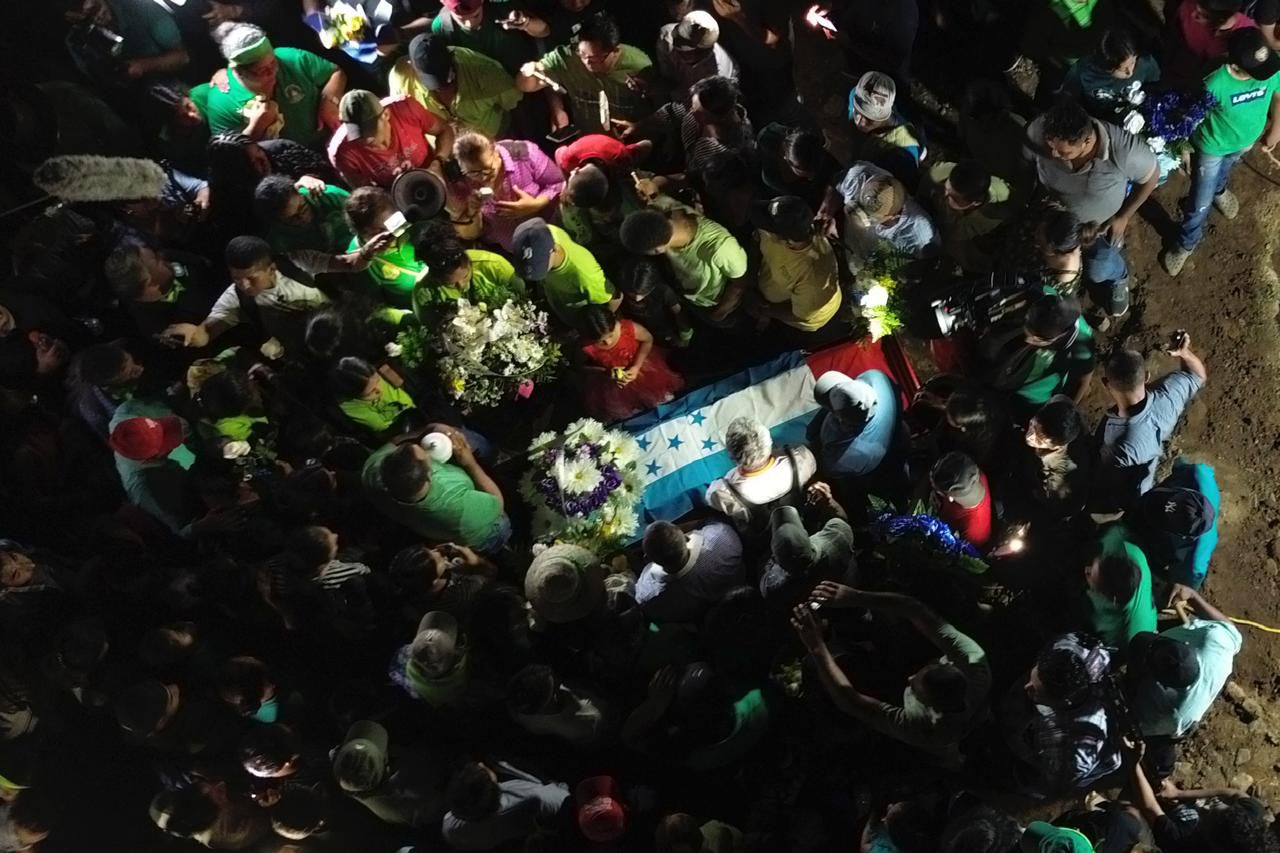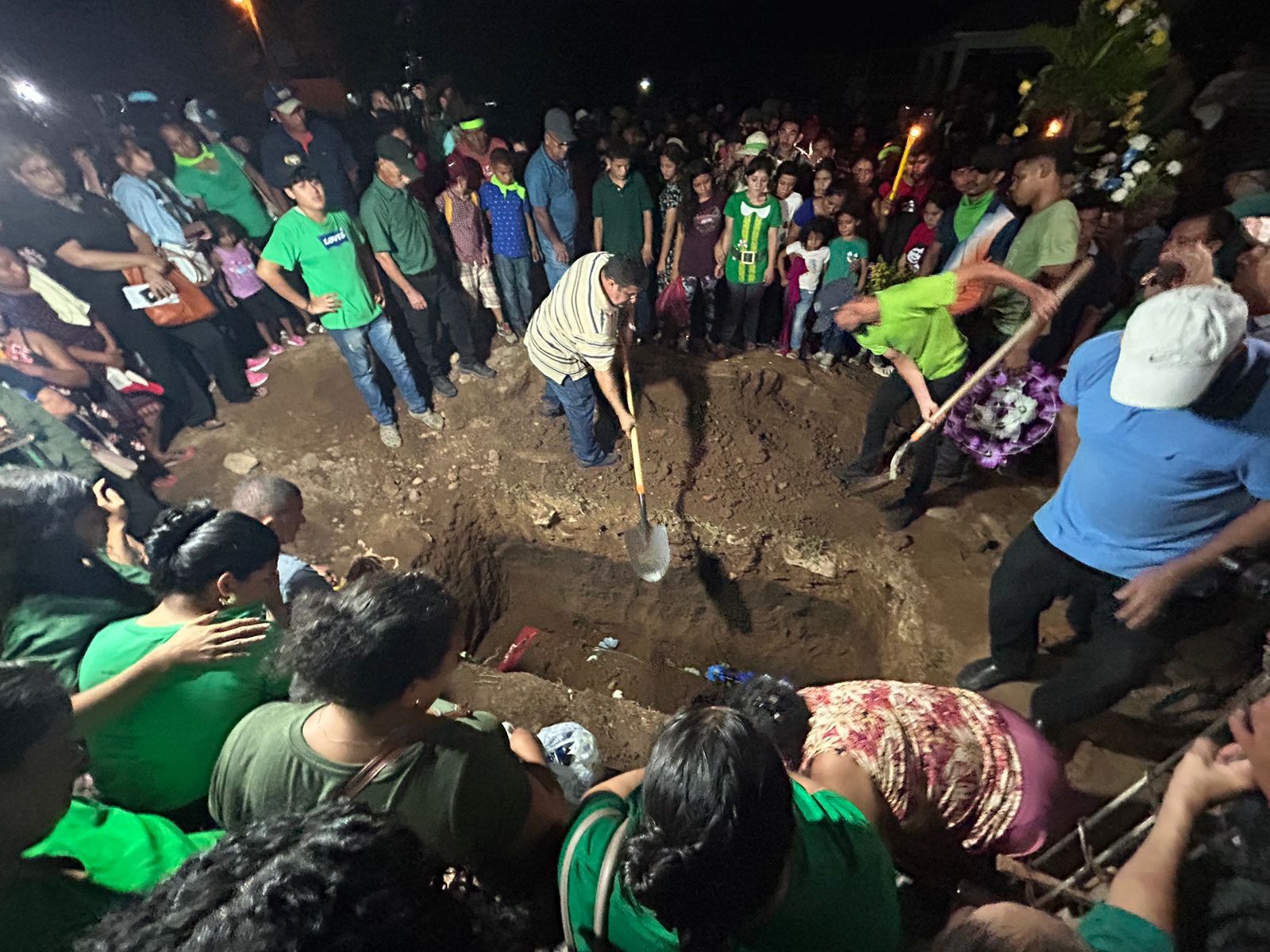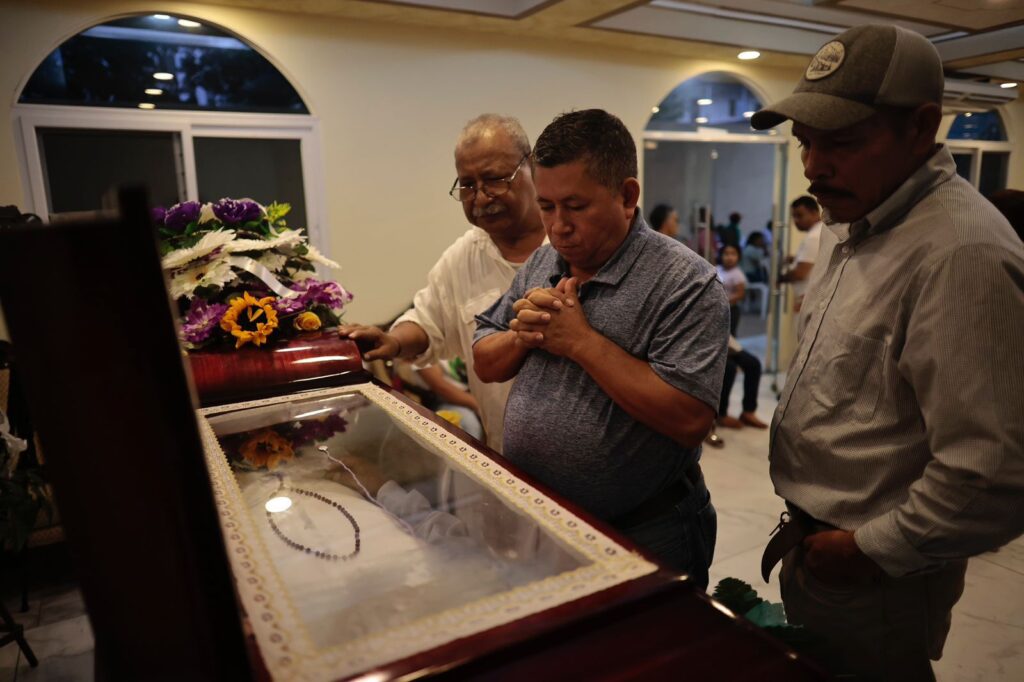The homicide of Juan Lopez, an environmental defender in Honduras, sheds gentle on the connection between drug trafficking, mining and political corruption within the nation // Photograph by Orlando Sierra/AFP
Central America,
Features,
Honduras
November 18, 2024
By
Daniel Fonseca
A murmur of prayers fill the room the place Father Melo leads the funeral of Juan López, 46, the most recent environmental defender to be murdered in Honduras. Melo hangs his head and speaks at a sluggish however regular tempo. At this time his expression is a drained one.
The priest raises his arms and begins the ceremony, “Save us, Lord, from all evils.” The viewers of roughly 2 hundred buddies and fellow activists reply individually. Somebody shouts out, “From injustices!” The priest continues on, “Save us, Lord.”
Quickly after, an increasing number of voices begin calling out, itemizing their grievances towards murders, corrupt politicians and violence. Proper earlier than the service is about to come back to a detailed, somebody within the crowd yells out, “From the narcos,” and the priest, who nonetheless has his arms raised to the sky, gazes out over the faces of the group, responding “Save us, Lord!” one last time. The silence that follows these final phrases is heavy, as dense because the historical past that marks this land.
Father Melo (far left) with two mourners on the Amor Eterno funeral house in Tocoa, Colón wanting down over the casket of Juan López // Pictures by Jorge Cabrera
In Assist of Water and Life
Juan López was murdered on September 14 in Tocoa, a metropolis positioned in Bajo Aguán, a area in northern Honduras recognized for its excessive rate of violence and robust presence of drug traffickers. Juan was leaving a church along with his spouse and daughters when a hitman intercepted his automobile and fatally fired on the activist. It was the eve of Central American Independence Day.
The identical day of his dying, Juan had revealed a press release overtly condemning extractive industries in Honduras together with mining and agriculture companies which have negatively impacted the nation over the course of two centuries. He additionally spoke out towards the presence of drug trafficking within the space.
“I apologize prematurely if my phrases, which come from the soul, make anybody uncomfortable, however in honor of the reality, I have to say them,” he wrote.
“I apologize prematurely if my phrases, which come from the soul, make anybody uncomfortable, however in honor of the reality, I have to say them.”
The killing of Juan López is the most recent chapter within the story of Bajo Aguán. This agricultural sector has been the middle of environmental and social battle over the previous three many years which has claimed the lives of a whole bunch of farmers and environmental activists.
López, who had turn out to be extra concerned in campesino organizations in Aguán, devoted the final years of his life to preventing towards Inversiones Los Pinares (“Los Pinares”), a mining firm that’s a part of Grupo EMCO, a conglomerate with investments in vitality, development, mining, and airports which has ties to the Honduran navy and overseas buyers.
Since 2014, activists have attested that Los Pinares’ iron oxide extraction operations within the Carlos Escaleras Nationwide Park have been destroying the Guapinol and San Pedro rivers by lowering water ranges and resulting in the contamination of water as soon as used for laundry, cooking, and bathing. Environmental advocates declare that entire communities had been displaced as a result of the water they wanted to outlive was now not secure to drink.
As a part of their struggle for environmental justice, Juan and fellow members of the Tocoa Public Items Committee confronted threats, harassment and defamation on social media which in the end was violence and state-sanctioned criminalization. Different environmentalists within the area have confronted related challenges.
In 2019, members of the Guapinol group protested by organising the “For Water and Life” encampment. For 88 days they blocked entry to the core zone of the Carlos Escaleras Nationwide Park the place the mine was positioned till the encampment was violently dismantled by state police.
Shortly after, a judicial persecution led by the Public Ministry accused protestors of being a part of an aggressive ploy that set hearth to a number of containers owned by Los Pinares and a safety guard’s automobile. This accusation initiated a authorized course of towards Juan López and 30 of his fellow activists. Eight of Juan’s associates spent practically three years in jail.
It’s tough to find out if the occasions within the accusation occurred or not. Nevertheless, group representatives have denounced the malicious actions of the prosecutor’s workplace, accusing it of colluding with EMCO. Amnesty Worldwide declared the eight imprisoned environmental human rights defenders to be “prisoners of conscience,” asserting there was no professional proof to justify the felony prices and that they had been prosecuted solely for exercising their human rights.

Crowds of mourners encompass the casket of Juan López at Cementerio Nuevo in Tocoa, Colón // Photograph by Jorge Cabrera

As two mourners shovel dust, many attendees are wearing inexperienced to indicate their assist for the environmental justice motion // Photograph by Jorge Cabrera
The Energy of EMCO and Lenir Pérez: An Empire Constructed on State Complicity
The President of Grupo EMCO is Lenir Pérez, a Honduran businessman who turned more and more influential in the course of the administrations of former Honduran President Juan Orlando Hernández between 2014 and 2022. The nation’s former president is presently serving a sentence for drug trafficking in the US. Pérez—who has additionally donated to the campaign of Salvadoran President Nayib Bukele—has been instantly accused by environmental defenders in Aguán for his involvement within the violence, persecution, and criminalization that they’ve confronted lately.
A World Witness report titled “Honduras: The World’s Most Dangerous Country for Environmental Activism,” published in 2017, collected testimonies from affected group members who claimed Pérez provided bribes to achieve the communities’ assist. When individuals refused to just accept the cash, they had been met with threats.
“[Both Lenir Pérez’s] firm and public officers have been working with complete impunity and so they haven’t been stopped,” says Leonel George, a councilman in Tocoa and Juan’s former colleague. He’s additionally one of many defendants charged within the Guapinol case. “The state ought to have canceled the mining concessions and contracts a very long time in the past and never proceed to pull its toes, however they continued selling [Lenir’s projects]. This worsened the menace scenario,” he asserts.
Along with the assist Pérez has obtained from the state, his initiatives have materialized due to his business companions, such because the steelmaker Nucor, one of many largest metal producers on the earth. An investigation revealed that Nucor and EMCO had been companions from 2015 to 2023 which coincides with a interval of heightened criminalization and violence towards these opposing mining initiatives.
In April 2023, one in every of Lenir Pérez’s properties in the US was raided by the FBI, who questioned him about his connection to the steelmaker, in response to Pérez’s lawyer.
One other key ally of EMCO has been the mayor of Tocoa, Adán Fúnez, a member of the ruling Liberty and Refoundation Occasion. On June 13, 2024 Fúnez irregularly held an open city corridor assembly to make sure the set up of a thermoelectric venture based mostly on petroleum coke i.e. “petcoke”, a petroleum byproduct recognized for its dangerous well being results and which isn’t regulated in Honduras. This venture is owned by one other of EMCO’s firms.
In September 2024, weeks earlier than Juan’s assassination, a 2013 video emerged displaying Carlos Zelaya, brother-in-law of President Xiomara Castro, and Adán Fúnez negotiating marketing campaign cash with a few of Honduras’ most distinguished drug lords.
In September 2024, weeks earlier than Juan’s assassination, a 2013 video emerged displaying Carlos Zelaya, brother-in-law of President Xiomara Castro, and Adán Fúnez negotiating marketing campaign cash with a few of Honduras’ most distinguished drug lords.
In one in every of his final public appearances, Juan López, alongside representatives from the Municipal Committee in Protection of the Frequent and Public Items of Tocoa, demanded the resignation of the mayor. “It is dependent upon the individuals’s power to pressure him to resign as a result of, below these circumstances, he’s now not the best individual to steer the future of the municipality,” López stated on the convention. Days later, he was assassinated.
The Legacy of Water Rights Activists in Honduras
The information reveals that Juan’s dying will not be an remoted case. In 2023, Honduras turned the third most harmful nation on the earth for environmental defenders after Colombia and Brazil. In response to a World Witness report, 18 environmental human rights activists were murdered in Honduras that yr.
Among the many 18 deaths recorded that yr, three had been activists from Aguán: Jairo Bonilla, Aly Domínguez, and Oquelí Domínguez. All three had labored with Juan.
This assassination has many parallels with the dying of one other Honduran human rights advocate who devoted her life to defending Honduras’ rivers: Berta Cáceres, murdered in 2016. Each confronted company conglomerates backed by the state of their protection of water rights for the communities who relied on rivers and different pure sources. These instances spotlight the violence 1000’s of activists expertise in Latin America and all through the world.
Cáceres fought towards a hydroelectric venture owned by the Atala household, one of many wealthiest households in Honduras. This venture obtained funding from the Central American Financial institution for Financial Growth, the Dutch financial institution FMO, and Deutsche Financial institution regardless of allegations of irregularities within the venture and documented violence towards communities opposing its set up. Following her homicide, Berta’s household continues to demand justice that by no means appears to come back.
The killing of Juan López left a deep wound throughout the Aguán group. Along with dropping one in every of their most essential leaders, group members proceed to witness the steep value paid by these selecting to face as much as companies that search to divide up management over their lands. His dying, coupled with the shortage of response from the state, has left a way of abandonment amongst those that are nonetheless left to withstand.
Though the Honduran authorized system continues to vow justice, the individuals of Tocoa aren’t so positive that these accountable for Juan’s assassination will likely be prosecuted. Weeks after the funeral, they really feel unprotected. Jessenia, a group journalist who has supported the struggle to defend Aguán’s rivers plainly states “In the event that they dare to go after Juan, what can the remainder of us anticipate?”
About
Daniel Fonseca
Daniel Fonseca is a Honduran journalist and columnist. He covers points associated to human rights, migration and the atmosphere. He has coordinated a group of 44 reporters in 16 international locations to analyze housing entry for girls, youngsters and LGTBIQ+ people. He was nominated for the 2023 Gabo Award and was a 2024 finalist for the Inter American Press Affiliation’s Award for Excellence in Journalism. His work has been revealed in 11 international locations and translated into three languages. He lives in Tegucigalpa, the place he stories and writes.
Daniel Fonseca es periodista y cronista hondureño. Cubre derechos humanos, migración, medioambiente y violencia. Coordinó a un equipo de 44 periodistas en 16 países para investigar el acceso a la vivienda para mujeres, jóvenes y personas LGTBIQ+. Fue nominado al Premio Gabo (2023) y finalista del Certamen a la Excelencia Periodística de la Sociedad Interamericana de Prensa (2024). Su trabajo se ha publicado en 11 países y traducido a tres idiomas. Vive en Tegucigalpa, donde reportea y escribe
